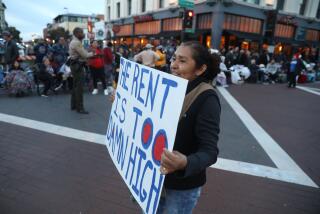Taking stock of the economy
Re “Bailout’s strategic target: housing,” Sept. 22
As I understand it, the government is buying up mortgages from lenders and investors so that these folks won’t go bankrupt.
Will the government in turn forgive the poor people who are losing their homes? Or will it at least issue no- or low-interest loans for the amount the government paid for the loans?
That would be the kind of bailout that would make sense.
Richard P. Young
Claremont
Your article states: “Economists generally agree that a housing recovery is essential to an overall financial recovery, although there is a difference of opinion over how aggressively the government should intervene to prop up home prices.”
So economists want to reinflate home values. Wasn’t part of the problem that home prices were too high for the average person to make payments? As far as I can tell, home prices need to drop further.
Things are askew if regular people can’t achieve a minimum level of security while executives have bonuses, bailouts and no personal responsibility for their investment decisions. Home prices are really just the tip of the iceberg.
Jessica Hall
Echo Park
Re “We can’t afford politics,” editorial, Sept. 21
I agree with your opinion that we need solutions, not politics. However, before we can have the right solutions, we have to admit what the real problem is.
The problem is deeper than the credit crisis relating to the housing bubble. The real problem is that our nation is addicted to debt -- credit cards, student loans, auto loans, excessive margin debt for stocks, elective wars financed with debt, etc.
How do our politicians want to solve this problem? By piling on more debt. It’s like giving a drunk more booze.
I know all the arguments for trying to stimulate an economy on the brink of recession, but that is the wrong approach now. Our currency is at risk of complete collapse. Better to have home prices drop so they will be more affordable than to continue encouraging people to take on boatloads of debt.
That means changing our priorities. I’d rather we have one less mortgage-broker job and one more fix-our-infrastructure job. We need a concerted, shared effort to reduce our debt.
Joseph Oppenheim
San Diego
There has been a lot said and written lately about the need for more government regulation of mortgage and financial markets. It might be wise to remember that it was government regulation, policy and incentives for homeownership that got us into this mess. The Federal Housing Administration, Fannie Mae, Freddie Mac, tax incentives and low interest rates all helped create this crisis of bloated, then collapsing, home prices.
For the free market to work, it has to breathe and cycle like any other living thing. If you try to pump it up with incentives and regulation when it is trying to take a rest, you will have a bubble and a bigger collapse next time. That’s just common sense.
I doubt the government can protect us from ourselves without doing more damage to our freedoms and our markets than it has already. That’s just the nature of government, collectivism and statism in general.
Laird Foshay
Paso Robles
Re “Bailout tab: $700,000,000,000,” Sept. 21
The Democratic Congress shouldn’t let President Bush and his Republican cohorts stampede it into swallowing their bailout whole. It should allocate enough money to keep financial institutions afloat until Congress can engage in a swift but thorough debate about this $700-billion subsidy.
Steven F. McNichols
San Francisco
I thought it was telling that in your story on the bailout, you used the phrase “unfettered power.” Isn’t that the mantra of the Bush administration?
Tom Burton
Van Nuys
Now that we have passed the trepidation of talking about a recession and are speaking of the current economic situation as the worst since the Depression, it is time to recognize that this president can only be mentioned in direct comparison to another hallowed icon of failure, Herbert Hoover.
Bill Waxman
Simi Valley
The Times’ story refers to a number that transcends the comprehension of even exceptional mortals.
To put it in perspective: If a printer could crank out a $100 bill every second, it could print $1 million in less than three hours.
The same printer working 24 hours a day would have to work more than 220 years to print $700 billion.
Darrell
Manderscheid
Fountain Valley
More to Read
Inside the business of entertainment
The Wide Shot brings you news, analysis and insights on everything from streaming wars to production — and what it all means for the future.
You may occasionally receive promotional content from the Los Angeles Times.










